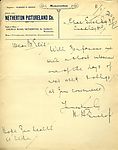It was always intended that the Institute should be used for showing films, as well as being a centre of union business, social activity, educational meetings and lectures. Thus, in 1915 it was leased to Howard Bishop’s Netherton Pictureland Company for use as a cinema at a rental of £25.00 per month.
The office space continued to be used for union affairs, but the main hall saw use as a cinema for the next eighteen years. On occasions, when the large hall was needed for other events, such as a Labour Party bazaar, Howard Bishop was informed, and would be very accommodating, to the extent that he would allow the use of his piano.
It was called “Pictureland”, as was Howard Bishop’s other cinema in Netherton, but local people always referred to it as the “‘Stute". Films were transported between the two cinemas by tram. Usually, films were advertised either in the local press or on a poster outside the “Stute” itself. The same picture would be shown on a Monday, Tuesday and Wednesday. The programme would change on Thursday, and run until Saturday.
"Pictureland" at the "Stute" was open six days a week, and as it was the only cinema in the Cradley Heath area at the time, there were always queues outside. At the entrance there was a wooden kiosk with a small pigeon-hole, where the ticket money was taken. Another set of doors led into the main hall, which was filled with long, wooden benches. When cowboy films were shown, children used to pretend to horse ride on the benches, and occasionally a bench would break in two. The screen was towards the back of the stage, and the pianist was positioned at the front, to one side of the screen.
It cost three-pence to sit upstairs in the balcony, two-pence for a seat downstairs, and just a penny to sit on one of the window ledges. Those sitting on the window ledges used to burn their legs as they dangled them against the four narrow, hot pipes that circled the room. Peanuts (or monkey nuts) were a popular cinema snack at the time. People sitting downstairs would often be pelted by peanut shells, thrown down from the balcony seats above.
Saturdays were particularly popular, because anyone visiting the cinema on that day would be offered a choice of free tea, an orange or an apple, when they purchased their tickets. A showing usually lasted for two hours, beginning with a news film or a two-reel comedy, followed by the main feature film and ending with a serial. The hall would then be cleared ready for the next house. Usually there were two houses, one between 6 p.m. and 8 p.m., and the other between 8 p.m. and 10 p.m.
Western films were shown on a Saturday; Tom Mix, Buck Jones, Ken Maynard and Eddy Polo were some of the screen heroes of the day. The pianist, Mr Harry Raybold, accompanied the features, and he was famous for his dramatic chords, especially during the chase sequences.
A new "Majestic" cinema opened in Cradley Heath in 1933. The "Stute" tried to compete, and retain its customers, by introducing live entertainment during the intervals, but was still only able to show silent films. The "Majestic", however, presented "talkies" and soon became the more popular venue. "Pictureland" at the "Stute" closed in the spring of 1933.
Rollover the captions in the box to see the available images in thumbnail format, click the caption to see the full-size image
| Reference: | 701 |
| Keywords: | |
| Archive Ref: | |
| Updated: | Thu 6 Sep 2007 - 12 |
| Interpretation written by | Louis Howe |
| Author's organisation | Curatorial |
| Organisation's website |
